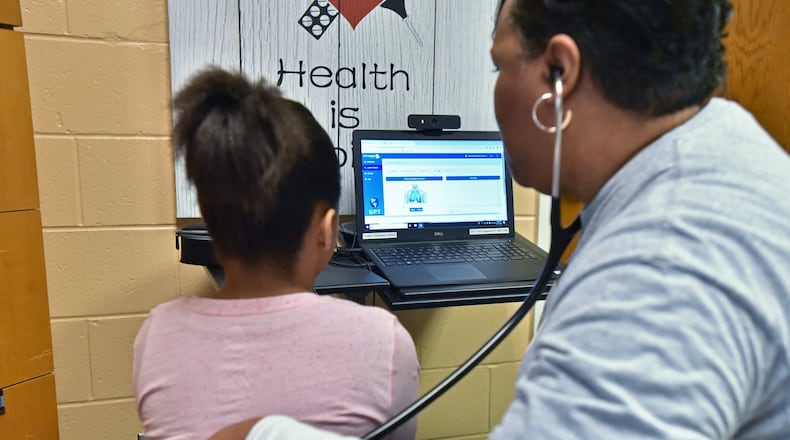Our state is a leader in FinTech, aerospace, and cyber security.
Home to the Atlanta Hartsfield Jackson International Airport and Port of a Savannah, we are a logistics hub for international business.
With peanuts, peaches, and poultry, our farmers and agri-businesses put food on the table.
Our beaches, mountains, and rivers are destination locations for tourists and filmmakers alike. Our Southern Hospitality is second to none.
Designated as the “Best State for Business” six years in a row, Georgia is experiencing unmatched economic growth, investment, and prosperity. While the Peach State tops most lists, we still have our challenges.
Multiple studies rank Georgia’s healthcare system as one of the worst in the nation. With high infant mortality rates, a medical provider shortage in rural Georgia, and lackluster healthcare outcomes, we cannot ignore the obvious.
To keep Georgia moving in the right direction, we have to address our shortcomings. To ensure a bright future for all Georgians – regardless of zip code – we have to put patients ahead of the status quo.
This week, we took a small – but important – step towards crafting a Georgia-centric healthcare system by introducing Senate Bill 106.
The Patients First Act, carried by my Floor Leader, Sen. Blake Tillery, paves the way for state leaders to craft innovative flexibility options within Medicaid and the Affordable Care Act to lower healthcare premiums, enhance accessibility, and ensure quality outcomes in every part of our state.
This legislation is the first step to a healthier, more prosperous Georgia.
Since Obamacare was forced on our families, monthly premiums have more than doubled over the last five years. Insurers have left Georgians high and dry, leaving the market, and leaving limited, expensive options for both patients and providers.
While Republicans and Democrats disagree on many pressing issues in Georgia, we can all agree that insurance premiums in the Peach State are crushing families, businesses, and economic opportunity.
Hardworking Georgians are spending thousands of dollars each month – often more than their home mortgage – to pay for bare-bones health insurance and overpriced prescription drugs.
Some get a second job just for the health insurance. Others choose not to have insurance, pray for good health, and hope for a job with benefits.
We can – and we must – do better.
Through the Patients First Act, we can explore a series of innovative programs showing results in other states – like high-risk pools and reinsurance programs – to stabilize the commercial markets and encourage private insurers to offer policies in Georgia. Through competition, we can lower insurance premiums while improving coverage for hardworking Georgians. With innovative solutions, we can cut healthcare costs for individuals and small businesses. We can take action while keeping our promises to the most vulnerable Georgians. Pre-existing conditions will always be covered.
While areas like Augusta, Atlanta, and Savannah continue to grow, it still feels like the Great Recession in parts of rural Georgia.
Since 2010, eight hospitals have closed their doors – losing jobs, economic investment, and access to care.
Seventy-nine counties have no OB/GYN. Sixty-four counties have no pediatrician. Nine counties in Georgia have no doctor.
Through the Rural Hospital Tax Credit, which empowers the private sector and stakeholders to invest in community healthcare facilities, we have helped local hospitals keep their doors open.
In my recommended budget for 2019, I funded additional residency slots for primary care physicians and loan forgiveness programs for those who choose to practice in underserved communities.
However, to ensure accessible healthcare for all Georgians – no matter your zip code – we must address the root problems making local hospitals insolvent and care difficult to access.
The Patients First Act empowers state leaders to craft flexibility options that will make insurance affordable but – more importantly – make healthcare available for the most vulnerable.
By creating a Georgia-centric healthcare system, we can protect our local hospitals, support primary care physicians, and enhance access to behavioral health and wellness.
We can encourage the best and brightest to enter the medical field. We can give a reason for healthcare professionals to return home – and provide care – after training.
We have untapped potential. Now is the time to leverage it.
Our state is home to world-renowned medical facilities and providers.
Founded in 1828, the Medical College of Georgia is one of the oldest and largest training facilities in the United States.
Morehouse Medical School continues to earn top honors for training physicians and serving at-risk populations with premier outcomes.
The Shepherd Center, Grady, and Georgia Cancer Center are household – and respected – names.
We can better utilize these resources through innovation.
Hardworking Georgians deserve affordable, accessible care that leads to quality health outcomes. Every patient has a different story. Every family has different needs.
The Patients First Act will empower us to explore more services for more Georgians to ensure better results.
This carefully crafted reform effort will improve quality measures by addressing the needs of the patient instead of treating the symptoms.
The process to explore, craft, and implement a new healthcare model which lowers costs, enhances accessibility, and improves outcomes is long and complicated.
Some will push for a costly – and unsustainable – expansion of Georgia’s one-size-fits-all Medicaid program.
We cannot double down on a big government approach that costs too much and fails to deliver. Coverage does not equal access. Instead, we must innovate and craft a healthcare system made by Georgians – for Georgians.
By setting aside our political differences and partisan talking points, we can ensure a healthier, more prosperous Georgia.
Together, we can craft a Georgia-centric healthcare system and put patients first.
About the Author
Keep Reading
The Latest
Featured


